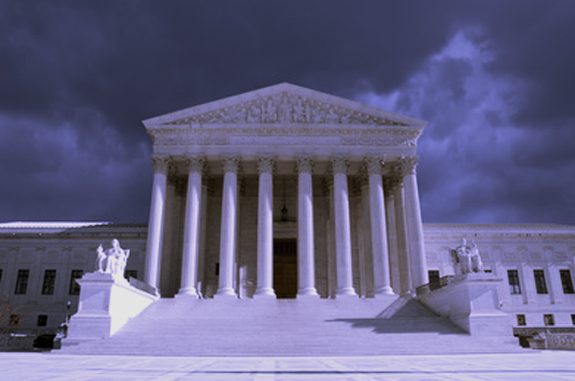

Let’s begin by recognizing that the case of the Kentucky county clerk who refused to issue marriage licenses to same-sex couples because same-sex marriage conflicts with her religious faith raises questions that both sides in this argument need to take seriously.
Up to a point, this particular dispute has been settled—more or less. Kim Davis was jailed for contempt of court while others in her office issued the licenses, then was released. Whether that’s the end of it remains to be seen, but whether it is or isn’t, issues involved in the Kentucky dispute are likely to keep coming up. They deserve consideration before the fog of conventional wisdom sets in.
People who share Davis’ faith-based opposition to same-sex marriage need to recognize that the right claimed here—for public officials to refuse to enforce laws they disagree with in conscience—is not a principle to be invoked casually or unconditionally. How far do you go? Where do you draw the line? Should the principle apply not only to county clerks but to military commanders and even commanders in chief?
But supporters of same-sex marriage need to recognize that casually overriding an appeal to conscience is a response worthy of a totalitarian state. Many of them made it a practice to appeal to conscience back when they were working to win approval of what they provocatively called “marriage equality.” If their appeal to conscience was legitimate then, why is somebody else’s appeal to conscience suddenly illegitimate now?
And somewhere in the no man’s land between these two sides lies another question. It may be overly subtle for some but for others it’s highly relevant: How truly compromising to conscience is it for a county clerk simply to certify that same-sex couples have met the legal requirements to marry in her state? That’s the sort of question professional moralists like to chew on.
Particularly in a pluralistic democracy like ours, matters like these deserve to be debated with mutual respect. Merely saying, as some do now, “The Supreme Court has spoken, so shut up and fall in line” is inappropriate, to say the least. And some assertions made during the Kentucky controversy should not be allowed to stand unchallenged. In that category I place a recent editorial in The Washington Post.
This was the heart of it:
“Ms. Davis cites ‘God’s authority’ in rejecting marriage applications. But within the confines of the county clerk’s office, there is only one relevant authority: the civil laws of the commonwealth of Kentucky and of the United States of America.”
Granted, that could be read in several different ways, but at the very least it has an ominous Big Brother ring. No higher authority than the civil law as it happens to stand at some particular moment? Sorry, but I’m not buying that.
The editorial writer then gave an example that destroyed his case: “Soldiers must fight wars they may disapprove of.” Reading that, I thought: Has whoever wrote this never heard of conscientious objection? America has recognized it as grounds for refusing military service for many years. During the Vietnam era, the American bishops even expressed support for selective conscientious objection—refusal on conscience grounds to serve in a particular war.
America has found ways to accommodate conscientious objection before. It needs to do that now in the case of people who object to same-sex marriage. It’s unreasonable and unjust to coerce them to cooperate with gay marriage and punish them when they say their consciences don’t allow that.
If you value the news and views Catholic World Report provides, please consider donating to support our efforts. Your contribution will help us continue to make CWR available to all readers worldwide for free, without a subscription. Thank you for your generosity!
Click here for more information on donating to CWR. Click here to sign up for our newsletter.


